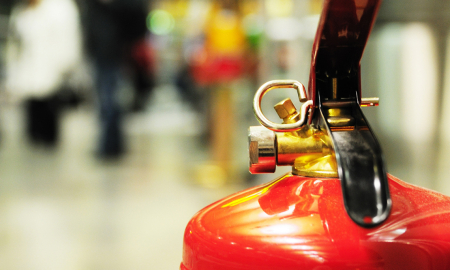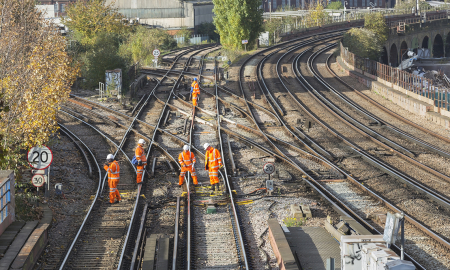Fire Management in the Rail Sector
Fire is a significant risk to any organisation and work setting - and implementing - a fire management programme will set procedures in place to protect workers and the general public from the potential destruction it can cause.
As well as personal safety, rail operators, rolling stock manufacturers and employees have many factors to take into account when it comes to fire management, including environmental liability, infrastructural damage and equipment failure, and must therefore keep abreast of relevant guidelines and recommended safety measures at all times.
Please note that this article refers specifically to railway buildings, such as depots, stations, signal boxes and other infrastructure. Specific regulations apply to rolling stock, including construction materials, design, vehicle fire safety and evacuation.
What is a fire management programme and what does it entail?
An effective and compliant fire management programme will set out, manage and coordinate appropriate fire safety procedures to reduce the risks of fire and guarantee the safety of those working on the premises. Employers must ensure that effective control measures are in place to support fire prevention and protection and to reduce the risks posed by fire as far as reasonably practicable, such as:
- Providing a clear statement to workers that fire precautions, protection and prevention is taken seriously at all levels of the organisation
- Allocating clear management responsibilities for fire prevention and precautions
- Providing information on policy, including implementation
- Properly understanding what is involved in all areas of operation in order to implement appropriate and effective controls
- Monitoring and reviewing the fire risk assessment and control measures to ensure ongoing effectiveness
- Ensuring all workers are aware of the risks of fire in the workplace and their likely effects
- Providing information on the legal framework surrounding fire precautions and prevention and the employer/employees duties under them
How can I reduce the level of risk posed by fire in buildings across my rail organisation?
A detailed fire risk assessment is essential for every workplace, as it enables employers to clearly identify the risks on their premises and what actions are required to minimise them. This risk assessment must be carried out by a competent person and take into account such factors as the size of the premises, the nature of activities, all groups at risk, the maximum number of employees and other persons present at one time and whether any flammable substances or materials are in use.
In addition to having fire risk assessments in place, employers are recommended to implement the following control measures to further reduce the level of risk:
- Carry out weekly tests on the building’s fire alarm and detection system using different call points in rotation
- Ensure that there is an effective system of maintenance and inspection of fire safety-related systems and equipment
- Ensure that there is control of building alterations which could prejudice fire safety (eg services passing through fire walls or floors without adequate fire stopping)
- Carry out six monthly evacuation drills, ensuring people can exit the building safely and quickly. These drills should cover operational shifts and transient workforces where applicable
- Ensure the correct firefighting equipment (and staff trained in its use) is in place and arrange for it to be serviced annually by a competent person
- Provide fire safety training for employees and ensure scheduled refresher training is undertaken
- Ensure that fire doors are kept closed unless on automatic release devices
- Ensure that there is a clear fire procedure and arrangements for calling the fire and rescue services in place
What are the legal requirements surrounding fire management in the rail sector?
In England and Wales, the Regulatory Reform (Fire Safety) Order 2005 (RRFSO) is the current and only general legal requirement for fire safety. The Order applies to all non-domestic premises in England and Wales and places duties on both the ‘responsible person’ (normally the employer), employees and those who provide services related to fire safety, such as maintenance or installation of fire safety systems and equipment. Separate legislation applies in Scotland – the Fire Safety (Scotland) Regulations 2006 – which requires employers to plan, organise, monitor, control and review fire safety measures, provide adequate means of fighting and escaping fire and deliver relevant information and training to employees.
New fire safety guidance for sub-surface and underground railway stations in England – The Fire Precautions (Sub-surface Railway Station) Regulations – were published in 2009, which impacts railway stations with at least one enclosed platform partially under a building or within a tunnel. This guidance recommends that fire safety training for staff must take place once every seven months, that a minimum of two staff are present on the station at any one time and that a plan of the station is readily accessible for the fire and rescue service.
Finally, the Dangerous Substances and Explosive Atmospheres Regulations 2002 (DSEAR) require employers to assess and control the risks to safety to protect employees and other persons from fire, explosions and reactions caused by substances corrosive to metals. Such risks must be eliminated or minimised as far as is reasonably practicable when there is work being carried out by an employer, when a dangerous substance is present/liable to be present and when a dangerous substance could pose a risk by causing a fire or explosion.
What are the duties of a Responsible Person regarding fire management on the railway?
The specific duties placed on the ‘responsible person’ under the Regulatory Reform (Fire Safety) Order are to:
- Take general fire precautions and implement appropriate fire prevention measures
- Conduct a fire safety risk assessment
- Design and implement appropriate fire safety arrangements for the effective planning, organisation, control, monitoring and review of the preventive and protective measures
- Eliminate or reduce risks from dangerous substances
- Implement appropriate firefighting and detection measures
- Provide and adequately maintain emergency routes and exits
- Design and implement procedures for serious and imminent danger and for danger areas – with specific reference to safety drills and evacuation procedures
- Consider additional emergency measures in respect of dangerous substances (if any)
- Adequately maintain the premises and any facilities, equipment and devices provided in connection with fire safety
- Provide information and training to employees, employers and the self-employed from outside undertakings
- Cooperate and coordinate where two or more responsible persons share, or have duties, in respect of premises (whether on a temporary or a permanent basis)
- Appoint one or more competent persons to assist in undertaking the preventive and protective measures
What are the duties of a rail employee with regards to fire management?
All employees have a duty placed upon them to contribute to the management of fire safety in the workplace to an extent, taking reasonable care for themselves and towards relevant persons who may be affected by their acts at work. They should cooperate with their employer at all times with regards to fire safety matters, informing them (and any other employee with specific responsibility for workplace safety) of any work-related situation that represents a serious and immediate danger to safety and of any shortcomings in the employer’s protection arrangements. However, this should only apply where an employee’s level of training and instruction would reasonably expect them to identify such risk.
Any employees who refuse to cooperate on fire safety matters should be subject to employment disciplinary procedures.
SOCOTEC’s team of Health & Safety consultants are well equipped to assist your organisation with fire management, helping it to comply with relevant legislation, conduct fire risk assessments and create bespoke fire and emergency response plans. To find out more, click here or get in touch.
For additional resources, please refer to the Rail Industry Fire Association (RIFA).






Add new comment